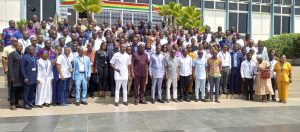By: Franklin ASARE-DONKOH
The Minister of Sanitation and Water Resources (MSWR), Madam Lydia Seyram Alhassan, has called on Water Sanitation and Hygiene (WASH) sector stakeholders to come up with a deliberate plan and strategies to tackle issues of gender parity in WASH.
According to her, gender mainstreaming in WASH requires deliberate efforts to integrate gender perspectives into every single stage of planning, implementation, monitoring, and evaluation of programmes by recognising and addressing the different needs, roles, and priorities of women and men in accessing and benefiting from WASH services.
The minister made the remarks at the maiden WinWASH forum and the launch of the Network in Accra.
Addressing the gathering on behalf of the minister, a Director General of the MSWR in charge of Administration, Madam Jennifer Buabeng, tasked stakeholders to reaffirm their commitment to ensuring that every woman and girl has access to WASH services.
The theme for the maiden WinWASH forum and launch of the network was “Gender mainstreaming for inclusive WASH service delivery in Ghana.”
Madam Buabeng explained that empowering women with the knowledge, resources, and opportunities to contribute meaningfully to decision-making processes that affected those of their communities was also relevant.
According to her, access to clean water, proper sanitation, and hygiene facilities was not just a matter of convenience but a fundamental human right, yet millions of women and girls around the world continued to face significant barriers in accessing those basic services.
“True inclusivity in WASH service delivery demands that we leave no one behind-that we prioritise the most marginalised and vulnerable groups in our efforts to build resilient and sustainable communities, which ensures privacy, dignity, comfort, safety and accessibility for all,” she noted.
Madam Buabeng urged women to inculcate into the young people in their care, things that would make them more sensitive to the plight of all manner of people, especially women and girls.
In her welcome address, the Founder and Convener of the Network, Madam Nora Ollennu, expressed the need to intensify advocacy in mainstreaming gender in WASH and its systems strengthening to address the inequalities in achieving universal access.
“WASH services were essential to life – water is life, sanitation is dignity, and hygiene is health,” she reiterated.
“Despite the fact that the 2021 population and Housing census established that access to basic drinking water in Ghana is 87.7 percent, with 96.7 percent in urban areas and 74.4 percent in rural areas, the reality behind these statistics is low/limited, and in some communities, there are no WASH services at all,” she noted.
Madam Ollennu said women and girls were the hardest hit when it comes to issues of WASH, as they trekked long distances on daily basis to find alternative water resources, thus the need for deliberate planning in providing WASH services to the vulnerable, such as girls, youth, and persons with disabilities who spent longer hours in search for water.
About the network
WinWASH Advocacy Network is made up of female leaders in WASH-related organisations, both public and private sector, academia, and interested, dedicated individuals willing to help improve WASH in Ghana and promote gender equality.














